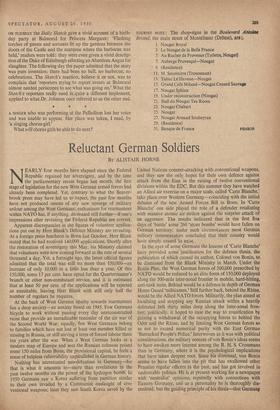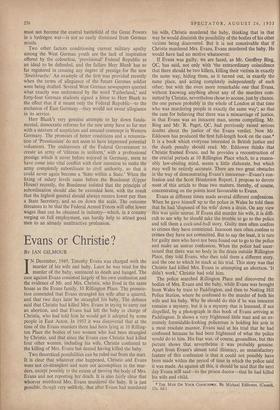Reluctant German Soldiers
BY ALISTAIR HORNE NEARLY four months have elapsed since the Federal Republic regained her sovereignty, and by the time the parliamentary recess began last month, the first stage of legislation for the new West German armed forces had already been completed. Yet, contrary to what the Beaver- brook press may have led us to expect, the past few months have not produced omens of any new upsurge of military ardour among the West Germans; enthusiasm for rearmament within NATO has, if anything, decreased still further—if one's impressions after revisiting the Federal Republic are correct.
Apparent discrepancies in the figures of volunteer applica- tions put out by Herr Blank's Defence Ministry are revealing, At a foreign press luncheon in Bonn last October, Herr Blank stated that he had received 140,000 applications. Shortly after the restoration of sovereignty this May, his Ministry claimed that volunteers were now coming forward at the rate of several thousand a day. Yet, a fortnight ago, the latest official figures admitted that the total was still no more than 150,000—an increase of only 10,000 in a little less than a year. Of this 150,000, some 17 per cent. have opted for the Quartermaster's branch or other non-combatant service, and it is estimated that at least 50 per cent. of the applications will be rejected as unsuitable, leaving Herr Blank with still only half the number of regulars he requires.
At the back of West German apathy towards rearmament lies a deep anxiety—an anxiety based on 1945. Few Germans bicycle to work without passing every day unreconstructed ruins that provide an ineradicable reminder of the air war of the Second World War; equally, few West Germans belong to families which have not lost at least one member killed or missing in Russia, or still serving a term of forced labour 'there ten years after the war. When a West German looks at a modern map of Europe and sees the Russian colossus poised some 150 miles from Bonn, the provisional capital, he feels a sense of helpless vulnerability unparalleled in German history.
Nothing has accentuated neo-defeatism in Germany—for that is what it amounts to—more than revelations in the past twelve months on the power of the hydrogen bombs: In 1950 Germans saw a Korea suffering from partition similar to their own invaded by a Communist onslaught of con- ventional weapons; later they saw South Korea saved by the United Nations counter-attacking with conventional weapons, and they saw the only hopes for their own defence against attack from the East, in the raising of twelve conventional divisions within the EDC. But this summer they have watched an Allied air exercise on a major scale, called 'Carte Blanche,' take place over Western Germany—coinciding with the initial debates of the new Armed Forces Bill in Bonn. In 'Carte Blanche' one side played the role of a defender retaliating with massive atomic air strikes against the surprise attack of an aggressor. The results indicated that in the first five days of 'battle' some 260 'atom bombs' would have fallen on German territory; under such circumstances most German military commentators concluded that their country would have simply ceased to exist.
In the eyes of some Germans the lessons of 'Carte Blanche' have provided some justification for the defence thesis, the publication of which caused its author, Colonel von Bonin, to be dismissed from the Blank Ministry in March. Under the Bonin Plan, the West German forces of 500,000 prescribed by NATO would be reduced to an elite force of 150.000 deployed along the 500-mile inter-zonal frontier in mobile, hard-hitting, anti-tank units. Behind would be a defence in depth of German Home Guard 'militiamen.' Still farther back, behind the Rhine. would be the Allied NATO forces. Militarily, the plan aimed at localising and stopping any Russian attack within a heavily defended belt thirty miles deep along the inter-zonal fron- tier; politically, it hoped to ease the way to reunification by gaining a withdrawal Of the occupying forces to behind the Oder and the Rhine, and by limiting West German forces so as not to exceed numerical parity with the East German `Barracked People's Police.' Interwoven as it was with political considerations, the military content of von Bonin's ideas seems to have awoken more interest among the R. H. S. Crossmans than in Germany, where it is the psychological implications that have taken deepest root. Since his dismissal, von Bonin seems to have fallen into the pit that has swallowed other Prussian regular officers in the past, and has got involved in undesirable politics. He is at present working for a newspaper with 'neutralist' opinions, reputedly with connections with Eastern Germany, and as a personality he is thoroughly dis- credited; but the guiding principle of his thesis—that Germany must not become the central battlefield of the Great Powers in a hydrogen war—is not so easily dismissed from German minds.
Two other factors conditioning current military apathy among the West German youth are the lack of inspiration offered by the colourless, 'provisional' Federal Republic as an ideal to be defended, and the failure Herr Blank' has so far registered in creating any degree of prestige for the new `Streitkraef ie.' An example of the first was provided recently when the terms of allegiance of the future German soldier were being drafted. Several West German newspapers queried what exactly was understood by the word 'Fatherland,' and forty-four German students signed a letter to Herr Blank to the effect that if it meant only the Federal Republic—to the exclusion of East Germany—they would not swear allegiance in its service.
Herr Blank's very genuine attempts to lay down funda- mental, democratic reforms for the new army have so far met with a mixture of scepticism and amused contempt in Western Germany. The promises of better conditions and a renuncia- tion of 'Prussianism' do not seem to have impressed potential volunteers. The endeavours of the Federal Government to create an army of 'citizens in uniform,' with a professional prestige which it never before enjoyed in Germany, seem to have come into vital conflict with their intention to make the army completely subordinate to civil authority, so that, it could never again become a 'State within a State.' When the fixing of salary levels came before the Bundesrat (Upper House) recently, the Bundesrat insisted that the principle of subordination should also be extended here, with the result that the highest general should always receive lower pay than a State Secretary, and so on down the scale. The outcome threatens to be that the Federal Armed Forces will offer lower wages than can be obtained in industry—which, in a country verging on full employment, can hardly help to attract good men to an already unattractive profession.



































 Previous page
Previous page